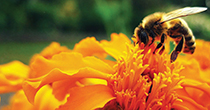Growing Beekeeper and Public Concern About Honey Bee Losses
by Donald Sutherland

Honey bees have long been a source of fascination for humans with their amazing ability to communicate to their fellow workers using waggle dances, odour sensitivity, directions, distances to food, and colour of food sources. They even bring back samples for any doubting Thomas’s who may lurk in their midst. The complexity and sensitivity of their neurological equipment is beyond dispute. Why is such a sophisticated insect suffering from Colony Collapse Disorder?
Could peer reviewed research shed some light? In the May 9, 2014, Insectology Bulletin, lead researcher Chensheng (Alex) Lu, reports that six out of twelve of the neonicotinoid-treated hives were abandoned as soon as warm spring weather occurred. “This may suggest the impairment of honey bee neurological functions, specifically, memory, cognition, or behaviour. We demonstrated in the study that neonicotinoids are highly likely to be responsible for triggering Colony Collapse Disorder in hives that were healthy before the arrival of winter.”
Statistics Canada reports a growing number of bee hives in Canada, but cautions that bee health is a serious concern. Beekeepers call this a crisis, not a concern. Ontario reports a 68 per cent hive loss for the 2013-14 winter, granted, a particularly cold winter. On September 3, 2014, the Canadian Beekeepers Association filed a $400 million class action suit against two of the largest chemical producers of pesticide control products containing neonicotinoids used on corn, canola, and soybean seeds to control troublesome insects such as aphids. Source: CBC News, Technology and Science, September 3, 2014. The European Union put these chemicals under a two-year moratorium in April of 2013.
On September 14, 2014, SumOfUs, a non-profit registered in Washington, DC, posted on the internet, “A Death Sentence for Bees,” reporting that a massive pesticide company has asked the US government to increase the legal limit for bee-killing pesticides by 40,000 per cent. Yes, 40,000 per cent. SumOfUs.org is requesting petition signing and donations to help mount a strong lobby against this proposed legislation.
The battle lines are shaping up. I am reminded of Big Tobacco with deep pockets denying the growing evidence linking lung cancer with cigarette smoking. Big Chemical admits to unsustainable bee losses but points to mites, habitat loss, and long cold winters as much more likely bee killers than neonicotinoids.
Where are bees thriving? Briarpatch, May/June 2014, features an article titled Rare Honey: The hope of inner city hives by A. Naccarato. He talks about beginning with one hive, named Elizabeth, placed in Vancouver’s downtown eastside in June, 2012. Elizabeth surprised everyone by producing 40 litres of honey that summer. Today, Hives for Humanity manages 73 hives throughout downtown Vancouver. The hives are quite productive with low losses. Naccarato attributes this success to the absence of neonicotinoids in the great variety and long season of flowering plants available to urban bees. The stakes are extremely high. Our food supply is at serious risk. Contact federal and provincial politicians. This is a David and Goliath battle.
Reprinted courtesy of Farmland Legacies, PO Box 1768, Wynyard, SK SOA 4TO, phone: 306-554-5263, website: farmlandlegacies.org. Donald Sutherland is a professional/personal coach and relationship builder living in Winnipeg, Manitoba.
|
